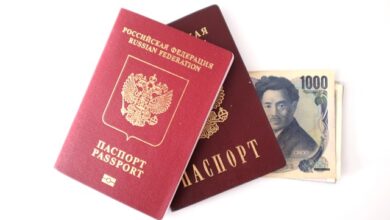French Passport Benefits and Visa-Free Travel Options

The French passport is one of the most powerful travel documents in the world, offering its holders a wide range of benefits, including extensive visa-free or visa-on-arrival access to numerous countries. Holding a French passport not only provides ease of travel but also grants access to various social, economic, and political advantages within the European Union (EU) and beyond. In this article, we’ll explore the key benefits of holding a French passport, its global mobility privileges, and how it enhances the quality of life for its citizens.
1. Overview of the French Passport
The French passport is issued to citizens of France by the Ministry of the Interior (Ministère de l’Intérieur ). It serves as both a travel document and proof of French nationality. The French passport ranks consistently among the top passports globally in terms of visa-free access, thanks to France’s membership in the EU, Schengen Area, and other international agreements.
As of 2023, the French passport allows visa-free or visa-on-arrival entry to over 180 countries and territories , making it one of the most desirable passports for global travelers.
2. Key Benefits of Holding a French Passport
A. Freedom of Movement Within the EU
One of the most significant advantages of holding a French passport is the freedom to live, work, study, and retire anywhere within the European Union (EU) and the European Economic Area (EEA) . This privilege stems from France’s membership in the EU and the Schengen Agreement.
- Schengen Area Access: France is part of the Schengen Zone, which allows passport-free travel across 26 European countries. You can cross borders without showing your passport at internal Schengen checkpoints.
- Right to Reside: As an EU citizen, you have the right to reside in any EU country for up to three months without needing a visa. For longer stays, you must register with local authorities but face fewer bureaucratic hurdles compared to non-EU citizens.
- Work and Study Opportunities: French passport holders can work or pursue education in any EU/EEA country under the same conditions as local citizens.
B. Social and Economic Benefits
France offers robust social welfare systems, and French citizens enjoy a variety of benefits, including:
- Healthcare: Access to France’s universal healthcare system (Sécurité Sociale ), which covers medical expenses at subsidized rates.
- Unemployment Benefits: Eligible citizens receive financial support during periods of unemployment.
- Retirement Pensions: Comprehensive pension schemes ensure financial security in old age.
- Family Allowances: Subsidies for families with children, including child benefits and parental leave.
C. Political Participation
Holding a French passport grants you the right to participate in the democratic process:
- Voting Rights: You can vote in national elections (presidential, legislative, and municipal) as well as European Parliament elections.
- Run for Office: French citizens can stand as candidates in local, regional, and national elections.
D. Consular Protection
French embassies and consulates worldwide provide assistance to passport holders in emergencies, such as lost documents, legal issues, or natural disasters. This protection extends to all EU citizens when traveling abroad in countries where France represents their home nation diplomatically.
3. Visa-Free Travel Options with a French Passport
The French passport opens doors to nearly every corner of the globe. Below are some highlights of visa-free and visa-on-arrival destinations accessible to French citizens:
A. Europe
- Schengen Area: Travel freely between 26 European countries, including Germany, Italy, Spain, and Greece.
- United Kingdom: While no longer part of the EU, UK allows French passport holders to stay for up to 6 months without a visa.
B. North America
- United States: French citizens can visit the U.S. for tourism or business purposes under the Visa Waiver Program (ESTA) for up to 90 days.
- Canada: No visa required for short-term visits; apply for an eTA (Electronic Travel Authorization) before boarding flights.
- Mexico: Enter visa-free for tourism or business stays of up to 180 days.
C. South America
- Most South American countries, including Argentina, Brazil, Chile, and Peru, allow French passport holders to enter visa-free for tourism or short stays.
D. Asia
- Japan: Stay for up to 90 days without a visa.
- South Korea: Enjoy visa-free entry for tourism or business for up to 90 days.
- Singapore: Access granted for up to 30 days without a visa.
- Hong Kong and Macau: Visa-free entry for tourism.
E. Africa
- Many African nations, such as Morocco, Tunisia, Senegal, and South Africa, offer visa-free or visa-on-arrival entry to French passport holders.
F. Oceania
- Australia: Apply for an eVisitor visa (subclass 651) online for free before traveling.
- New Zealand: Visit visa-free for up to 90 days.
G. Middle East
- United Arab Emirates (UAE): Obtain a visa on arrival for stays of up to 30 days.
- Israel: Enter visa-free for tourism or business for up to 90 days.
4. How to Obtain a French Passport
To qualify for a French passport, you must be a citizen of France. Citizenship can be acquired through:
- Birthright: Born to at least one French parent.
- Naturalization: Living legally in France for five continuous years (or two years if married to a French citizen).
- Marriage: Married to a French citizen for at least four years.
- Descent: Having a French grandparent or parent who was born in France.
- Exceptional Contributions: Demonstrating exceptional service to France in fields like science, culture, or sports.
Once eligible, you can apply for a French passport at your local prefecture (préfecture ) or through a French consulate if residing abroad. Required documents typically include:
- Proof of identity (national ID card or birth certificate).
- Proof of French citizenship.
- Recent passport photos meeting official specifications.
- Application fee (approximately €86 for adults).
5. Additional Perks of a French Passport
A. Dual Citizenship
France permits dual or multiple citizenships, allowing you to retain your original nationality while becoming a French citizen. This flexibility is particularly beneficial for expatriates and immigrants seeking to maintain ties with their home countries.
B. Cultural and Educational Opportunities
French citizens have access to prestigious institutions like Sorbonne University and École Polytechnique, often at reduced tuition rates. Additionally, cultural exchange programs such as Erasmus+ enable students to study abroad within the EU.
C. Global Recognition
The French passport carries significant prestige due to France’s historical influence, diplomatic presence, and commitment to human rights. It symbolizes belonging to a nation that values liberty, equality, and fraternity.
6. Limitations and Considerations
While the French passport offers unparalleled mobility and benefits, there are a few limitations to keep in mind:
- Taxes: French citizens are subject to taxation on worldwide income, regardless of where they reside.
- However, certain exemptions exist for long-term expatriates under specific conditions.
- Military Service Obligations: Though mandatory military service was abolished in France, citizens may still be called upon during national emergencies.
- Renewal Fees: Passport renewal incurs fees, and processing times vary depending on location.



